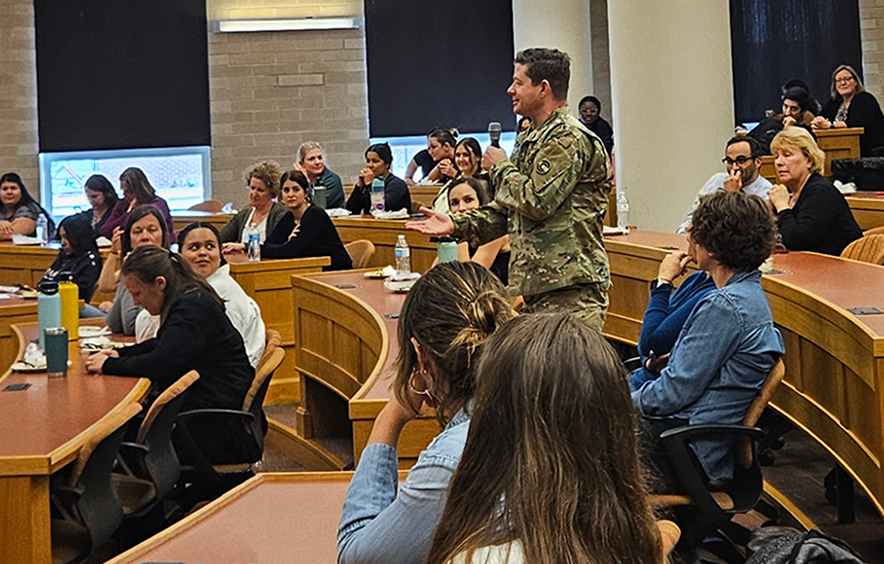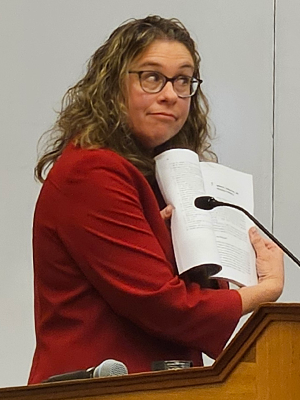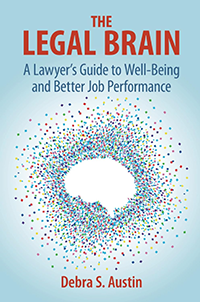New Book Offers Strategies for Coping with Professional Stress

(l-r): Sturm College of Law Professor of the Practice of Law Debra Austin, J.D., Ph.D.; Christine Harbison, Deputy District Attorney for the 17th Judicial District Attorney’s Office; Nathalie Martin, University of New Mexico; Associate Dean for Faculty Scholarship & Provost Professor Nancy Leong, Sturm College of Law.
An audience of over 100 students, faculty, staff, and community members gathered in the Sturm College of Law’s moot court room on September 5, 2024, to celebrate the publication of The Legal Brain: A Lawyer’s Guide to Well-Being and Better Job Performance (Cambridge University Press, 2024). The book, which provides resources for coping with the stress of the legal profession – and law school – is authored by Debra Austin, J.D., Ph.D., a faculty member in the University of Denver’s Lawyering Process Program.
Joining Austin to introduce the book were guest speakers Professor Nathalie Martin of the University of New Mexico School of Law and Christine Harbison, deputy district attorney for the Colorado 17th Judicial District Attorney’s Office, along with Sturm College of Law’s Nancy Leong, provost professor and associate dean for faculty scholarship, and Dean Bruce Smith. Welcoming the panel, Dean Smith remarked that Austin’s book had inspired him on several levels, including with thoughts on “how to train our students more effectively…in ways that provide them with greater happiness.”
The Lawyer Well-Being Crisis
In the introduction to The Legal Brain, Austin describes a crisis affecting individuals in the legal profession around the world: “a failure of individual lawyers to thrive.” The root causes of this crisis are not foreign to law students or individuals in the legal profession and range from the culture of competitive assessment that students encounter in legal education to the high-stakes professional world that lawyers enter after graduation. At the bottom of it all is stress – and the impact of chronic stress on brain function and mental health.
Since lawyers rely on their brains as their most valuable assets, Austin has set out in her book to provide tools for understanding how stress affects the brain as well as strategies for avoiding and healing the damage it causes. Each chapter of The Legal Brain provides a summary of the topic it addresses and then explains the science that backs it up. The basis of Austin’s book is “over a decade of research into stress, cognition, and how to optimize brain health and mental strength.”
The Brain’s Superpower
Despite addressing some of the serious dangers that the stressors of the legal profession can pose for the brain, Austin’s book offers hope in its description of neuroplasticity – “the brain’s superpower to constantly rewire with every action, experience, and thought,” and provides a pathway for readers to take actions in their lives to undo and prevent damage to this most valuable tool. Professor Martin, who is herself a published author on the topic of mindfulness, praised the accessibility of Austin’s approach in this book, saying that it “approaches this whole subject matter of lawyer well-being from the perspective of, ‘how do we make the brain healthy?’” Not just the science, but “specific tips.” Those tips include, as Dean Smith described it, “petting my dog even more than I already do,” and Martin expressed her appreciation for the quantity of dog photos adorning the halls of the Ricketson Law Building.
“You Cannot Work 24/7”
Christine Harbison, JD’21, remarked that it was “a little weird” to return to the Sturm College of Law to speak after being one of Dr. Austin's students in the law school's part-time JD program “before, during and after COVID.” Now a deputy district attorney, Harbison knows very well both the stressors of law school and the legal profession and advised the future attorneys in the audience: “you cannot work 24/7 and do your best job…you just cannot.” Instead, Harbison said, you must “maintain a sense of joy and fulfillment in the career that you have chosen for yourself.” Acknowledging that law students do not “have a bunch of extra time to chill and read,” Harbison noted that the sections of Austin’s book can be approached individually – as “little ditties” – practical activities that can be read and applied right away, and not necessarily in order.
Addressing the Crisis
In her comments as the author, Austin acknowledged that she herself struggles with some of the techniques that lead to greater mindfulness (she wishes she knew sooner about the power of meditation “so [she could start] sucking at it earlier”). But she credits her candidness with her own students about her struggles with stressors as creating an open environment where students’ reflections on their challenges with the competitive world of law school can be addressed. Austin was herself a part-time student when she attended law school at the University of San Francisco School of Law, and an early professional experience with a mentor in San Francisco helped inspire her thinking about lawyer well-being. That mentor died unexpectedly, and though she notes that it was a rare and tragic outcome, Austin hopes that The Legal Brain will help current and future lawyers find a path toward more complete mental health and wellness.





